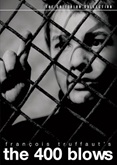The 400 Blows

Starring: Jean-Pierre Leaud, Albert Remy, Claire Maurier, Guy Decomble, Georges Flamant, Patrick Auffay, Francois Nocher
Directed by: Francois Truffaut
Rating: Not rated
Genre: Drama
1959
Times Seen:
Tim: 1
Summary: A boy (Jean-Pierre Leaud) struggles with home and school life, begins to contemplate a path that could lead him to a life of crime.
Review:
Tim: The 400 Blows is the first Francois Truffaut film I've seen, which is appropriate, given it was his feature film directorial debut. It also marks the beginning of the French New Wave of cinema, a movement I admit is hard for me to fully grasp. I get the rejection of traditional film structure, but I couldn't tell you what makes a film truly part of this or not. Besides that, I found this movie to be engrossing and effective, although I'd stop short of calling it a "great" movie. As I've dove into more world cinema, I feel like I've seen a number of films like this- ones that are undoubtedly important and influential, yet somewhat just under the "greatness" threshold. This might be where I differ with a lot of critics. Knowing what this film meant for French cinema, I have no qualms in calling it a landmark film, a critically important movie. I wouldn't say it's great on its own merits, though.
The film is highly autobiographical, which is always intriguing. We see the main character struggle in his early life. These are the most compelling sequences of the film- Truffaut approaches this character with an eye towards realism and telling a believable story. The whole film feels like Truffaut indeed dug deep into his own past and psyche to tell this story. It's interesting and occasionally sad. I did have an issue here, though. It felt like the movie had these opportunities to deliver truly emotional powerhouse punches and it failed to do so. As we start the film, we're told the protagonist is a "bad" kid. He gets into mischief, he defies his teachers. He seems like a bad apple. And then, as the film progresses, we start to see more of his background. The most powerful thing is seeing his family- he's a product of loveless parents. His mother, especially seems to have no care, no regard for him. Truffaut shows us this, but it's so subtle that it's easy to miss. I think he needed to lean into this movie to hit the audience with the emotional impact the film needed to achieve. The film tackles this on the margins, instead of digging in deeply enough.
I'll give you an example. There's this brilliant sequence where Antoine comes home, and he starts working on his homework. His parents show up soon after and he has to stop his work to help with dinner. They have a decent family meal, and then he's told to take out the garbage, help clean up, etc. Then, they usher him off to bed. The homework isn't mentioned, it's forgotten. This felt like a missed opportunity to me. His parents complain about his grades and his behavior, but unwittingly, they are the problem- they told him to stop working and then push him to bed- no mention of homework at all. This felt so heartbreaking to me, but the film glides over it. In the hands of a more experienced director, I think sequences like this could have shattered our hearts. Instead, we need to do the work to think through the implications. It's too subtle, too much on the margins. The full realization, the full consideration of this young boy who is trying to find his way in life, and has such bad parents in many ways- it's devastating. And yet, the movie never fully captures these emotions. That's the biggest reason I would consider this movie exceptionally good, but not quite great.
Truffaut does direct an interesting story and we absolutely become invested in Antoine and his life. Jean-Pierre Leaud does a fine job in the lead role- he gives one of those performances that feels so authentic, you almost can't comprehend how such a young actor could give such a truthful performance. Albert Remy is memorable as his father- his kindness is a bit surprising, and you're not exactly sure what to make of him. There's a surprising moment later in the film that makes you rethink his character quite a bit. Remy gives a very strong performance. Claire Maurier is quite excellent, too. As a mother, she's a total failure- I loved how she played this character without much self-awareness. Her son is the problem, her husband is the issue- she's always blameless, when indeed, she's the cause of a lot of her own problems. Seeing these three together is quite an unforgettable experience. Guy Decomble is quite memorable as the hardened teacher- it's vividly clear how teachers like him did more harm than good to kids. Decomble brings that aspect of the character right to the forefront of the film.
The 400 Blows is an artistic, influential film. I really did enjoy it and I'm glad I watched it to understand its influence on French and world cinema. I do think it's cool that Truffaut was nominated for an Academy Award for his first film- Best Original Screenplay. He didn't win, but it is a mark of how effective this film is. I do wish the movie leaned into the emotional pieces a bit more, but that doesn't mean this film isn't more effective than most. I'm a big fan of this film, even if I can't quite love it as much as other critics likely do.
Rating 1-10
Tim's Rating: 7.5
If You Enjoyed This Movie, We Recommend: Hiroshima mon Amor, Band of Outsiders, The Traveler
